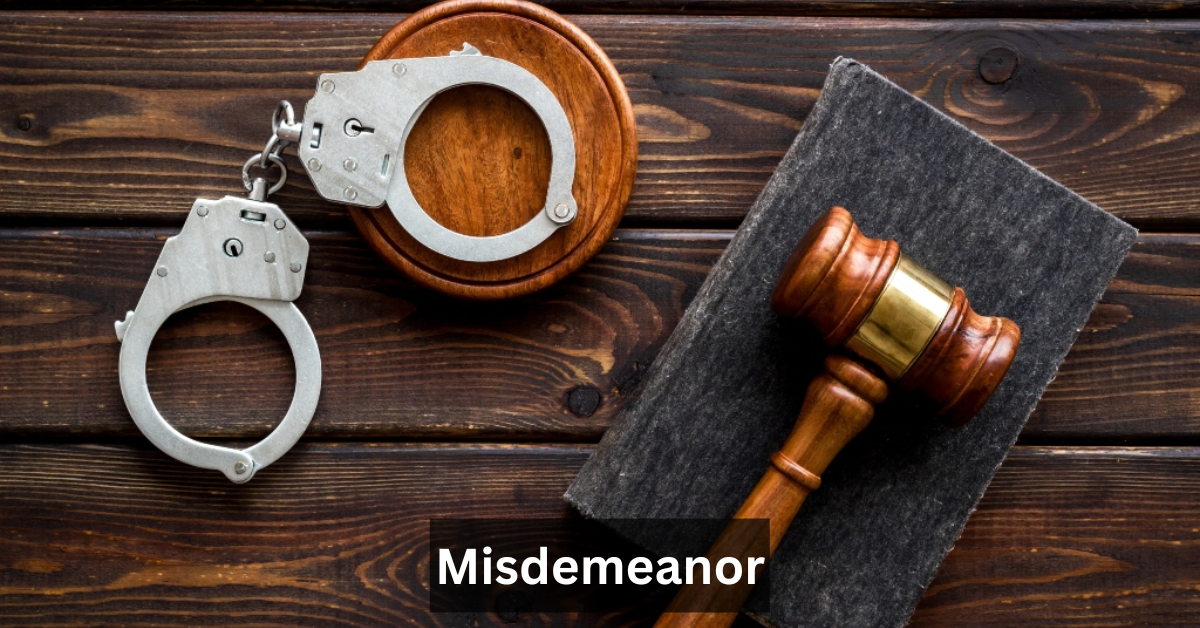A misdemeanor is a minor crime typically carrying up to one year in jail, unlike a felony, which leads to over a year in prison for serious offenses. Whether you’re involved in a legal matter or simply want to understand your rights under the United States Criminal Code, knowing this classification can be the difference between a minor legal inconvenience and life-altering consequences. These two types of offenses reflect the severity of the crime, the extent of punishment, and the lasting legal effects on an individual’s record. With the support of the Department of Justice (DOJ) and state penal codes, society categorizes crimes in a way that supports legal consistency, accountability, and fairness.
Understanding the Difference Between Misdemeanor and Felony isn’t just for lawyers—it’s essential knowledge that could impact your rights, your record, or someone you care about. Whether you’re facing legal questions, studying criminal justice, or simply curious about how the justice system works, this comprehensive guide breaks down the key distinctions in plain language. From definitions and examples to sentencing and long-term consequences, this blog offers everything you need to navigate the legal landscape with confidence.
What Is a Misdemeanor? A Legal Overview
Definition of a Misdemeanor
A misdemeanor is legally defined as a criminal offense less severe than a felony, typically punishable by a fine, community service, or imprisonment in a county jail for up to one year. The Difference Between Misdemeanor and Felony becomes evident here, as misdemeanors are generally less aggressive, involve minimal harm, and are frequently non-violent. Examples include petty theft, disorderly conduct, and first-time DUI offenses, often treated under state penal codes such as the California Penal Code. Misdemeanors fall into various categories: Class A (most serious), Class B, and Class C (least serious), depending on jurisdiction.
Common Types and Examples
Types of misdemeanors range across categories, including but not limited to:
- Class A Misdemeanor: Assault, second-offense DUI, resisting arrest
- Class B Misdemeanor: Criminal trespass, harassment, property damage
- Class C Misdemeanor: Traffic violations, public intoxication
Such crimes, while not typically leading to long-term prison sentences, can still carry burdensome legal consequences like probation and fines. Legal aid societies and public defenders often assist in these cases, helping mitigate outcomes.
Legal Process and Court Handling
Misdemeanor offenses are usually processed in criminal court and may involve a brief hearing or plea deal. Unlike felony cases, misdemeanor trials may not require a grand jury. The individual may be issued a misdemeanor citation instead of being arrested, depending on the nature of the offense. Although court procedures are less complex, a conviction still results in a criminal record that could impact employment, housing, and credit checks. Understanding this process is crucial when exploring the Difference Between Misdemeanor and Felony because the stakes, although lower, are still significant.
What Is a Felony? Examining the More Serious Offense
Definition of a Felony
A felony is a serious criminal offense punishable by more than one year in state or federal prison, extensive fines, and potential loss of civil liberties. The Federal Bureau of Prisons (BOP) manages federal felony sentences. When we consider the Difference Between Misdemeanor and Felony, felonies stand out due to their potential to impact a person’s life permanently, including the inability to vote, own firearms, or qualify for certain jobs. Felonies are often violent, financially devastating, or pose a significant threat to society.
Common Types and Examples
Types of felonies include:
- Violent Felonies: Homicide, sexual assault, armed robbery
- White-Collar Felonies: Embezzlement, large-scale fraud
- Drug-Related Felonies: Distribution, manufacturing, trafficking
Each of these falls under specific categories such as Class A (most serious, e.g., murder) to Class E (least serious, e.g., low-level theft), varying by state law.
Legal Process and Court Handling
The legal handling of felony charges is far more complex. The process begins with an arrest followed by either a grand jury indictment or a preliminary hearing. The accused is entitled to a criminal defense attorney, and the trial may be a lengthy affair involving evidence presentation, witness testimonies, and cross-examinations. District attorneys aggressively pursue felony cases due to their seriousness, making legal representation essential. Trials are held in higher criminal courts, often with a jury. The emphasis here is a prime illustration of the procedural and punitive Difference Between Misdemeanor and Felony.
Key Legal Differences Between Misdemeanor and Felony
Severity of Offense
The Difference Between Misdemeanor and Felony is largely anchored in the degree of harm caused by the act. Felonies are inherently more dangerous or damaging to individuals or society, often with malicious intent. Misdemeanors, though still punishable, generally involve lesser offenses and minimal threats to public safety.
Duration and Type of Incarceration
Misdemeanor convictions typically lead to short-term jail sentences in county jails, while felonies involve long-term incarceration in state or federal prisons. This distinction affects the prison environment, access to rehabilitation, and conditions of parole or probation.
Fines and Financial Penalties
Misdemeanor fines are typically capped under state laws, whereas felony fines can escalate into tens or hundreds of thousands of dollars, especially for white-collar crimes or organized criminal activity. Victim restitution is also common in felony cases.
Court Procedure and Legal Rights
Felony defendants are afforded greater constitutional protections due to the gravity of potential punishment. These include the right to a jury trial, right to legal representation, and the right to confront witnesses. In contrast, misdemeanors may involve summary trials with streamlined proceedings.
Punishment Comparison: Misdemeanor vs Felony
Jail Time vs Prison Time
Understanding felony vs misdemeanor jail time is key. A misdemeanor may result in no incarceration, especially with a plea deal or probation. Felonies, however, often involve mandatory minimum sentences, especially in federal cases. This is where the Sentencing Commission guidelines come into play.
Probation and Parole
In misdemeanor cases, probation is common and may be unsupervised. Felony offenders, once released, often enter parole programs requiring frequent check-ins, drug testing, and employment verification.
Civil Rights Impacts
Felony convictions often result in loss of civil rights, including:
- Voting disenfranchisement
- Firearm ownership restrictions
- Ineligibility for federal benefits
These impacts rarely apply to misdemeanor convictions, making this an important point in the Difference Between Misdemeanor and Felony.
How Criminal Records Are Affected
Criminal Background Checks
Felony convictions have a devastating impact on background checks and are almost always considered permanent unless expunged. Background check agencies are legally required to report felonies for employment, housing, or licensing screenings.
Expungement or Sealing Options
Most states have laws allowing misdemeanor expungement, meaning the record is sealed and cannot be used against the individual. Felony expungement is more limited, typically only allowed for non-violent or first-time offenders.
Long-Term Effects on Employment, Housing, and Education
Felonies can bar individuals from public housing, student loans, and job applications that require state licenses. Even a misdemeanor can delay opportunities, but the effect is often less severe and more manageable.
Legal Consequences Beyond Jail Time
Loss of Voting Rights
In many states, felons lose their right to vote, often for years or indefinitely. Misdemeanor offenders typically retain full voting rights.
Gun Ownership Restrictions
Federal law restricts gun ownership for felons, while certain state penal codes may impose this restriction on domestic violence misdemeanors too.
Immigration and Travel Issues
Felony convictions, especially aggravated felonies, can lead to deportation, inadmissibility, or denial of naturalization for non-citizens. Misdemeanors may also affect immigration status depending on the nature of the offense.
Felony and Misdemeanor Examples by State
Variations in State Laws
Each state classifies crimes differently. For example, a theft over $950 in California is a felony, but the threshold in Texas is higher. Understanding these differences helps illustrate the broader Difference Between Misdemeanor and Felony across jurisdictions.
State-Specific Punishment Levels
Some states also offer “wobblers”, crimes that can be prosecuted as either a misdemeanor or felony based on the District Attorney’s decision and criminal case severity. This is where prosecutorial discretion plays a huge role.
Can a Misdemeanor Become a Felony?
Repeat Offenses
Habitual misdemeanor offenses like repeated shoplifting or DUI can elevate charges to a felony.
Aggravating Factors
Using a weapon, targeting a vulnerable victim, or committing the crime as part of a group can raise the classification.
Prosecutorial Discretion
The district attorney may choose to charge a crime as a felony or misdemeanor depending on factors such as intent, prior record, and social impact.
Can a Felony Be Reduced to a Misdemeanor?
Plea Bargaining
Criminal defense attorneys often negotiate to reduce a felony charge through plea deals, especially when evidence is weak or mitigating circumstances exist.
Reclassification Laws
Some states allow certain non-violent felonies to be reclassified as misdemeanors after rehabilitation or sentence completion.
Post-Conviction Relief
Relief efforts may include petitions for record sealing, expungement, or appeals that lead to a reclassification.
Prosecution Presenting Evidence in Felony vs Misdemeanor Cases
In both misdemeanor and felony cases, prosecution presenting evidence plays a central role in establishing guilt. However, the intensity and depth of the process differ greatly depending on the charge. In misdemeanor cases, evidence presentation is often brief and may rely primarily on police reports and direct witness testimony. Trials are short, and courtroom procedures are less formal.
In felony cases, the prosecution’s presentation of evidence must withstand deeper scrutiny. Prosecutors work with law enforcement agencies to build extensive cases involving expert witnesses, forensic reports, and physical evidence. Every piece must be introduced according to strict evidentiary standards, and defense attorneys aggressively challenge the reliability of that evidence. Because the stakes are so high, U.S. Supreme Court decisions often set benchmarks for how such evidence must be handled in felony trials.
Conclusion
The Difference Between Misdemeanor and Felony is far more than a legal technicality—it is a dividing line between a mistake and a major offense. By understanding the criminal offense classification, including legal consequences, prosecution methods, and rights preservation, individuals are better equipped to protect their freedom and future. Whether you’re facing charges or simply want to stay informed, knowing these distinctions helps you make smarter choices and seek the right legal support when needed.
Frequently Asked Questions
Can a misdemeanor turn into a felony?
Yes, repeated misdemeanors or aggravating circumstances can elevate charges to felony level depending on the jurisdiction and the nature of the crime.
Are the legal procedures different for misdemeanors and felonies?
Yes, felony cases typically involve grand juries, longer trials, and more complex prosecution presenting evidence compared to misdemeanor cases.
Does a felony conviction affect civil rights?
Absolutely. Felony convictions may lead to loss of voting rights, firearm ownership, and difficulty in employment or housing.
Can a felony be reduced to a misdemeanor?
In some cases, yes. Through plea deal
Stay in touch to get more updates & alerts on Erome! Thank you



